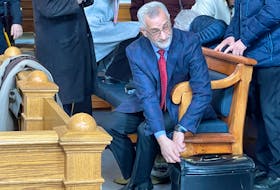ST. JOHN'S, N.L. — Premier-elect Andrew Furey will not face a review of his leadership by his party, as long as he can hold on to government.
At Monday’s Liberal Party of Newfoundland and Labrador annual general meeting, before Furey was named the premier-to-be, a motion came forward to amend the party bylaws.
Previously, members of the Liberal party had to be asked at every annual general meeting whether they wish to review the leadership of the party. The amendments to that bylaw of the party constitution now prevent the question from being asked of the party membership as long as the Liberals hold power, or if a leadership review was held in the previous 12 months.
The motion was brought forward by John Hogan, co-chair of the 2019 Liberal election campaign and campaign manager for Furey’s leadership bid.
Hogan declined to comment on the need for the change to the bylaws.
Spokesperson Meghan McCabe provided a statement on behalf of Furey.
“The membership of the Liberal Party of Newfoundland and Labrador voted on and passed the amendment, and as leader I support the party's process,” reads the statement.
“The party had been an outlier in the country in being constitutionally bound to vote on whether or not to hold a leadership review at every convention.”
Scott Matthews, an associate professor in Memorial University’s political science department, says there are pros and cons to removing the requirement for a leadership review.
“The consequences for democracy is there’s two ways of thinking about a change like this. One way focuses on democracy within the party who would see this as a bad development, in as much as it means members of the party have in effect less control, less influence on what the leader of the party is doing,” said Matthews.
“The other way of looking at it … our democracy works best when power is actually concentrated in cabinet and in the prime minister or the premier because it clarifies for voters who is really responsible for outcomes. When we have a majority government and a united party in making decisions, if things go badly, we know just who to hold accountable for those outcomes. In minority government situations or in situations where extra-parliamentary parties are exerting some kind of control or even part of the caucus, it becomes less clear who really is to blame. From that perspective, inasmuch as it makes it harder to hold governments accountable, it’s actually a good outcome for democracy that power is consolidated in this way. It clarifies political responsibility.”
Matthews says the lack of an immediate requirement to ask for a leadership review is common at higher levels of government.
“The only way a leadership review takes place is if the party loses power in an election,” said Matthews.
“At the same time, I had a look at the Progressive Conservatives here in Newfoundland and Labrador, and they allow these reviews to take place by a motion at a convention or at a special general meeting. It’s a bit more open currently in the PC party here, but I would say with this change the provincial Liberals are bringing themselves in line with the practice at the federal level.”
PC Leader Ches Crosbie asked his party to review his leadership at the party convention, scheduled for October. Crosbie called for the review as there is no current requirement for an automatic review in the party’s constitution, but he says that will change.
“It seems like a step backwards by the Liberal party establishment in order to shore up the power of their chosen one,” Crosbie said.
“While we’re moving forward with a democratic overhaul of our constitution, which should be adopted by the PC party in October when we have our annual general meeting, the Liberals seem to be moving backward.”
@DavidMaherNL









